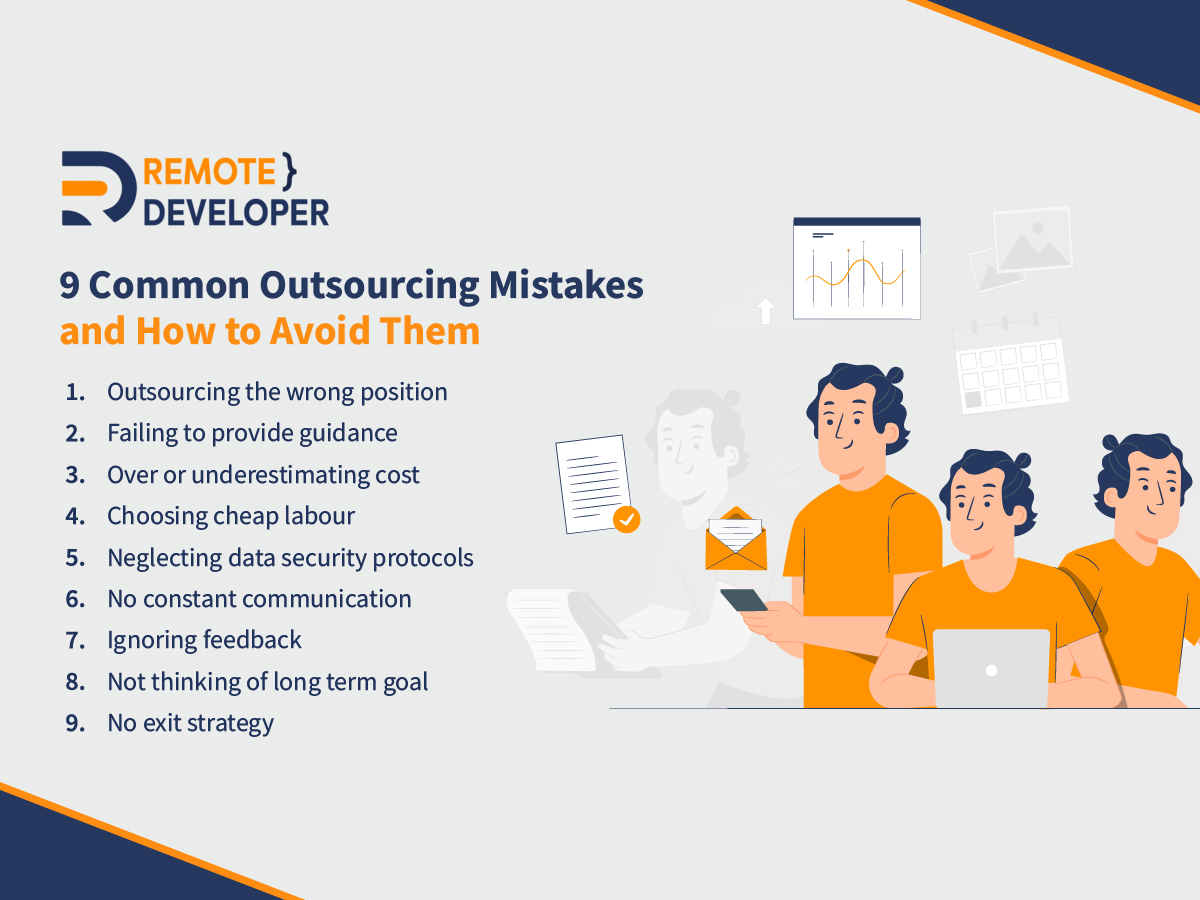Outsourcing is a strategy that has been used for quite some time. Many small and medium to large conglomerates have been taking advantage of outsourcing to meet their business needs when necessary. In fact, according to Statista, the global market size of outsourced services all over the world is valued at 92.5 billion U.S. Dollars.
Based on this statistic, one may think outsourcing is a good idea. However, many companies are still hesitant about outsourcing. Some believe that outsourcing comes with various issues. They worry about the quality of the work, reliability, and data security.
While some of these concerns are true, outsourcing has been around for decades. It has been demonstrated to be effective in the industry. In addition, there are various ways to fight these mistakes. This article will focus on nine outsourcing mistakes and some advice on how you can avoid them.
Outsourcing Mista ke #1. Outsourcing the wrong position/tasks
ke #1. Outsourcing the wrong position/tasks
As mentioned earlier, outsourcing is a common practice in the business world. It is often used to leverage skill sets that are not available internally. However, there are instances in which companies outsource positions that should not be outsourced. Jobs like those who make important decisions or do core business tasks.
Outsourcing the wrong position means outsourcing a function that does not contribute to the company’s goals and objectives. This can lead to poor decision-making, lack of innovation, and lower customer satisfaction.
Outsourcing Mistakes #2. Failing to Provide the Guidance
Outsourcing is not something that you can do on a whim. You must be careful about who you pick and what you expect from the third-party provider. If you don’t provide guidance, the outsourcing person will not know what to do, and it will cause many issues for both parties.
The person who does the outsourcing needs some way to measure success. They need clear goals and objectives to know when they have done well at their job. If they don’t know what is expected, they will likely make errors or give up if things get too tricky.
Outsourcing Mistakes #3. Overestimating / Underestimating Cost
Outsourcing is a popular way to manage costs. However, it can be costly if the company doesn’t do its research and estimate the cost of outsourcing. Knowing what kind of work you need outsourced and how much time it will take is essential.
In this regard, you must research and see the accurate prices for a particular job in the industry and adjust your pay accordingly. Don’t be guided by vendor prices. Focus on crucial factors such as their experience, skills, tools, etc.
In addition, there will be a circumstance where you need to extend and spend more during the outsourcing. Accidents happen. Likewise, you must be prepared for these accidents and have leeway with your budget.
Outsourcing Mistakes #4. Choosing Cheap Labour
Outsourcing is moving a company’s production, research, or other operations to another company primarily due to its cheaper labor. However, cheap is not always good. Many companies experience that the lowest price equates to the most inferior quality of work.
Vendors who can promise good outcomes for a low price shouldn’t be trusted. According to Outsource Accelerator, cheap labor practice usually involves the following:
- Child labor
- Underpaying employees
- Avoiding employee benefits
- Employees working in sub-par conditions
As such, make sure always to check their prices. Research the average pay for your outsourcing tasks and compare offers accordingly.
Outsourcing Mistakes #5. Neglecting Data Safety and Security Protocols
Data security has become a significant concern for many organizations regarding outsourcing. They are worried about the data they store and share with their clients. These risks have led to many high-profile examples of data breaches occurring in organizations that outsource their data security needs.
Likewise, before outsourcing, you must sign up with a third-party company with data security protocols. In addition, you should ensure the following:
- The vendor has the same security standard as your company
- Audit the vendor’s security and privacy protocols.
- Ensure that the vendor is legally obligated to fix any issue that may arise when it comes to the data breach
- Do background checks with vendors and their employees
- Monitor the security and privacy practices of the vendor.
Outsourcing Mistakes #6. No Constant Communication
Sometimes, outsourcing leads to a lack of coordination among various departments and teams and communication problems between the outsourced resources and the company’s employees.
This may lead to poor performance of outsourced tasks and impact the company’s productivity. Companies must provide training to their outsourced resources for them to perform their functions efficiently and effectively.
Outsourcing Mistakes #7. Ignoring the Outsourcing Partner’s Feedback
Outsourcing provides multiple benefits to a company and risks. And while there are specific ways to mitigate these risks, one of the best ways is by hearing the feedback of the outsourced company.
The outsourced company and its employees do everything from production implementation and quality assurance. They are the first ones to know if there are things that need to be improved, removed, or fixed.
So, when outsourcing a job, you must listen to their feedback. One way to do it is by asking for a monthly meeting to discuss their concerns.
Outsourcing Mistakes #8. Not thinking long term
When outsourcing, it’s crucial to have a long-term plan and perspective. Outsourcing is not just a short-term solution to resource scarcity. You can get more outsourcing, like increased production, more savings, and faster and better service.
A long-term plan will help your company get the most out of its outsourced relationship. The long-term strategy should include the following:
- Alignment of your company’s goals and Third-party vendor’s goal
- Outcomes that both parties want to achieve
- Time and cost to accomplish these outcomes.
Outsourcing Mistakes #9. No Exit Strategy
Outsourcing does not work for everyone. There will be circumstances when you are pushed to give up the agreement due to financial constraints or economic issues. Likewise, an exit strategy is necessary when outsourcing.
A sound exit strategy is vital for outsourcing. Your company will know what to do in case something happens. There are many types of exits, such as:
- Contract termination
- Outsourcing transfer
- Buyout
Final Thoughts
Outsourcing can be an excellent option for many companies. It allows you to focus on your core competencies and lower your costs. Still, it’s vital to research to avoid common mistakes and issues in outsourcing thoroughly. Circumventing these slipups can help you avoid outsourcing horror stories. And before you know it, you will be able to scale up your business through outsourcing.
If you are looking for the perfect outsourcing partner, Remote Developer can help you! Contact us now!

